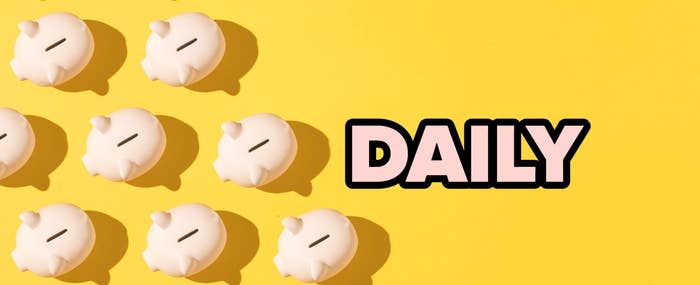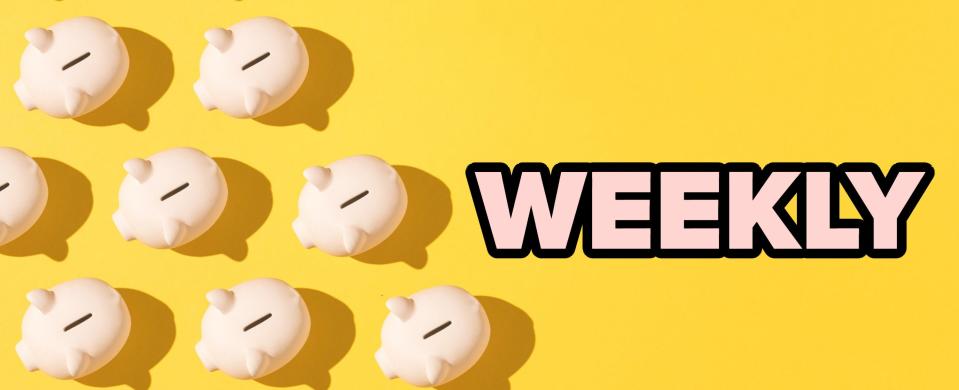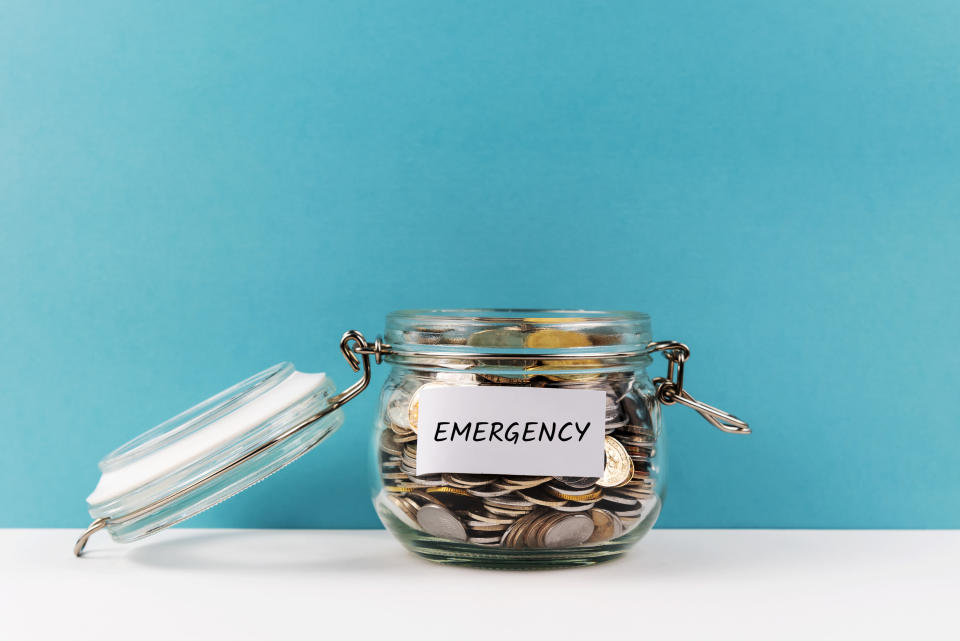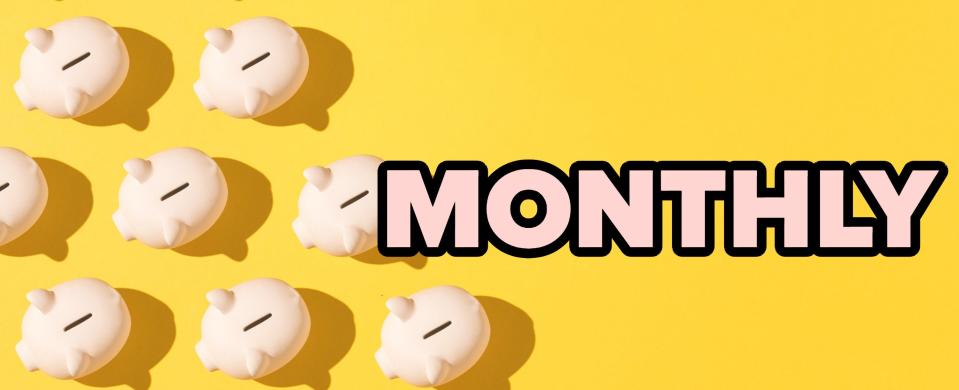16 Ways To Practice Self-Care With Your Money Every Day, Week, Month, And Year
When you think of "self-care," meditation retreats, therapy, lazy Sundays, and boozy brunches might come to mind. But it turns out that more and more folks are adding their finances into the self-care mix.

According to a recent study rolled out from Credit Karma, 3 out of 4 folks (77%) think of taking care of their money as part of their self-care. Plus, they consider it to be a top priority. No doubt, finances can be the ultimate source of stress.What's more, per the Credit Karma study, during the pandemic more than two-thirds of respondents said that money matters caused them to feel stressed or anxious. Among Gen Z'ers and millennials, about three-quarters share the same sentiment.
Thinking about making money management part of your self-care routine? Here are 16 simple ways to give your wallet some good self-care on a daily, weekly, monthly, and yearly basis:

1.If you don't already, check your bank balance once a day.

Ideally, this is something you should do daily so you always know how much money you have. To turn it into a habit, consider an if/then ritual. For instance, if you always drink water when you first wake up, then check your bank balance right afterward.
Or if looking at your balance is stressy, maybe you can check it before you start your nightly workout routine. Doing it before a workout (or even before just a couple of push-ups at home) means you can sweat those emotions out right away.
2.Track your spending so you know where your cash actually goes.
Prime Video / Via giphy.com
Start by downloading an app to help you track your spending, or sit down with your bank statements and make a spreadsheet. Then check in on it — ideally every day. You just might be surprised when you see where your money actually goes.
There are so many money management apps that can help you keep track of where your money goes — Mint, Truebill, Simplifi, and Dave — to name a few. Or your bank might offer similar tracking tools in their app.
My personal favorite as of late is YNAB. While it can be a teensy bit too nitty-gritty for some, it's really helped me stay on top of my money situation.
3.If you're feeling anxious about money, try jotting down your thoughts in a financial diary.

It might sound a little hokey. But it could be really healing to have a safe space to explore the woes, fears, concerns, and blocks you have around your finances. A money diary can also be a place to jot down your goals and track progress, and writing about your challenges might even help you formulate new plans.
Taking the time to do this personal exploration can even help you uncover the origins of your fears. In turn, you might be able to start changing your money narrative for the better. Even just a five-minute daily brain dump can make a difference.

4.Save up for your emergency fund so you have cash on hand in case of unexpected events.

We all need an emergency fund. But you don't need a ton of money to get yours started. If you automate your savings, you'll put your emergency fund savings on cruise control. See if your bank has a feature that will allow you to make automatic deposits. Otherwise, look toward autosaving apps and money platforms such as Digit, Qapital, and Chime, which can help make it super easy.
Experts recommend having three to six months of basic living expenses in your emergency fund. If you haven't started saving yet, commit to saving a hundred dollars, then work your way up incrementally. To get started, see if you can save $5 a week. You can always bump up the amount later on.
5.And get an opportunity fund going, too, so you have money for exciting things like career changes and vacations.
Nickelodeon / Via giphy.com
An emergency fund makes us think of the dreadful and unexpected — your car breaks down, you need 911 dental work, or you get laid off. An opportunity fund is a cash cushion you can tap into should something good and exciting pop up in your life.
I've leaned on my opportunity fund to take time off when I was struggling with severe burnout, and it allowed me to take a risk and try out freelancing. Maybe you want to take time off to get that business idea off the ground. Or you might want to just take off on a crazy, spur-of-the-moment adventure with your friends. Whatever form and shape that opportunity looks like, having money squirreled away so you can jump on it is pure gold.
6.Make time to learn more about money. It can boost your confidence and help you stay on track with your goals.
ABC / Via giphy.com
There are soo many great podcasts, documentaries, YouTube channels, TikTokers, books, and blogs that can teach you how to money. It really depends on where your interests lie, how you like to absorb information, and which personalities and educators vibe best with you.
I personally love podcasts that get to the emotions and narratives people have around money. Some of my faves are The Couples Financial Coach Podcast, Beyond the Dollar, and Real Simple's Money Confidential.
As for books, I really enjoyed Erin Lowry's Broke Millennial series (there are three of 'em), Tiffany "The Budgetnista" Aliche's Get Good With Money: Ten Steps to Be Financially Whole, and Ramit Sethi's I Will Teach You to Be Rich.
To get started, commit to listening to a short podcast or reading a chapter of a book each week. Even 15 minutes of learning a week can add up to big knowledge gains over time.

7.Create a money map to help you plan your spending and saving for the month.
snl / Via giphy.com
Getting a handle of your money situation begins with two major things: knowing how much money comes in each month, and knowing how it's spent. That's where your money map (aka budget) comes in.
If you've never made a budget before, you might like to try out a popular budgeting method, such as the 50/30/20 budget, which splits up your cash into needs, wants, and goals; the zero-sum budget, which gives every dollar a job; or the guilt-free budget, which prioritizes saving money first. Or check out what happened when another BuzzFeeder got help from a pro with making their first budget.
8.If you have debt, use a tracking system to help you manage it.

It might seem daunting, but it can be so helpful to have a clear picture of where all your debts are: student loans, credit cards, car loan, and so forth. Tally up your amounts owed, your monthly payments, and the interest rates. You can use a spreadsheet, pad and pencil, or a debt tracker app. Then, aim to check in on your debt at least once a week.
If you're feeling overwhelmed or experiencing debt fatigue (i.e., constantly worrying about your debt and trying to stay on top of payments), you might call your lender or credit card issuer to see if they have a relief program available. Another option is to speak to a financial or credit counselor. A good place to start is to check out organizations that are part of the National Foundation for Credit Counseling (NFCC).
9.Take yourself on a money date to look at the big picture.
10.Research ways to earn more money, like side hustles or passive income.
showtime / Via giphy.com
If you feel like you're hitting a wall financially, think of ways that you can earn more. You might pick up freelance work using skills or equipment you already have. Or consider gigs that either break up your usual routine or require you to learn new things outside of your day job. You might even explore passive income opportunities, which can have money rolling in while you binge your favorite shows (just know that these usually take some time and/or money to set up). Whatever you choose, adding another income stream can help you get ahead.
11.Set money goals and give yourself rewards when you hit them.
NBC / Via giphy.com
The sweet meat of money management is when you hit dem money goals! When you save for that amazing vacay, pay off a credit card balance, or reach that such-and-such goal, celebrate your wins by treating yourself. It might be a nice dinner, little day trip, or small splurge. Enjoy yourself — just make sure you keep it within your budget.

12.Check in on your retirement account balances, or open one if you haven't yet.
graves / Via giphy.com
Recently, a 19-year-old asked me if I could go back in time, what advice would I give to my young self? True story: I would open an IRA (Individual Retirement Account) as early as possible and keep contributing to it.
The earlier you sock money into a retirement account, the better. If your employer offers a 401(k) or 403(b), you can automate your contributions so the money is taken out of your paycheck before you ever see it. And if your employer has a match, aim to contribute enough to get it.
If you haven't opened a retirement account yet, consider opening an IRA. There are two main types: Roth and traditional. The main difference is when you'll be taxed: with a Roth IRA, you'll be taxed the year you make contributions. With a traditional IRA, you'll be taxed when you start making withdrawals (which will most likely be decades from now). If you think you'll be earning more down the line, a Roth IRA might be a good choice for you.
13.Add annual and quarterly bills to your calendar so they stop sneaking up on you.
Disney / Via giphy.com
Ah, and let's not forget to add those bills you only need to pay quarterly, every six months, or once a year. This might include your car insurance premium, other insurance premiums, car registration, website hosting, domain names, and subscriptions you pay for once a year.
One way to budget for these expenses is to divvy up the cost by 12, and then save that amount each month. For instance, if your car registration is $300 a year, then tuck away $25 a month to pay for it.
14.Ask for help from a mentor or financial pro.

Swimming in a sea of information on the interwebs and chatting with your trusted tribe about money can certainly do you good. But sometimes you'll want to tap into the expertise and guidance of a professional or money mentor.
Depending on what money issues you might be dealing with, or gaps in your knowledge and understanding about money management, consider taking a financial course. Once again, there are gobs, from investing courses to credit courses. Your employer might offer free financial coaching as part of their employee assistance programs (EAP). If in doubt, ask HR. You might also consider working with a financial coach.
Or if you need help with investment, retirement, and tax-savings strategies, then a certified financial planner might be more like what you're looking for. I like to use fee-only planners because they don't work off of a commission, but rather a flat rate. That ensures that they always keep your best interests at heart instead of pushing for sales. The XY Planning Network has a directory of fee-only financial professionals who are part of its network if you're interested.
15.Go over your insurance policies to make sure you have the right coverage at the best price.
PBS / Via giphy.com
Insurance can be confusing. And intimidating. Plus thinking about something bad happening to get a payout can dredge up unpleasant feelings. Still, it's important to make sure you have the right insurance policies in place, and in turn the right coverage amounts.
Once a year, go over your insurance policies and make sure the policy and what it covers are a good fit for your current life situation. As your life changes, so can your insurance. Plus, this can also be a great time to shop around for better rates.
One more thing: Some health insurance plans have free perks, which you might be leaving on the table. For example, some can hook you up with discounts to the gym or offer step-tracking or sleep-monitoring programs where you can earn rewards or gift cards. It's worth your while to read up on your policy or reach out to a rep to learn exactly what those perks are.
16.Finally, check your credit reports at least once a year.
Warner Bros Pictures / Via giphy.com
Having a high credit score can mean landing the best rates and terms on everything from a mortgage, car, personal loan, and credit cards. Having not-so-great-credit equals not getting approved for the loans and cards you want, or having to pay a ton of money in interest. In other words, it could cost you a small fortune.
Typically you can order one free credit report a year through AnnualCreditReport.com from each of the three major consumer credit bureaus — TransUnion, Equifax, and Experian. Pro tip: You can stagger them so you order one from each bureau every three or four months. The good news is that you can order reports for free weekly through April 20, 2022.
Besides checking your credit scores, make sure that all the information on your reports is correct. Mistakes or fraud could show up on your reports and hurt your scores. If you spot an error or fraudulent account, you can file a dispute with the credit bureau to have it removed from your report.
Do you have a tip for giving your wallet some care? Share how you like to take care of your money in the comments.
And for more stories about life and money, check out the rest of our personal finance posts.

